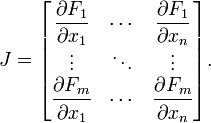Contents
Jacobians and their applications
by Joseph Ruan
Basic Definition
The Jacobian Matrix is just a matrix that takes the partial derivatives of each element of a transformation. In general, the Jacobian Matrix of a transformation F, looks like this:
 F1,F2, F3... are each of the elements of the output vector and x1,x2, x3 ... are each of the elements of the input vector.
F1,F2, F3... are each of the elements of the output vector and x1,x2, x3 ... are each of the elements of the input vector.
So for example, in a 2 dimensional case, let T be a transformation such that T(u,v)=<x,y> then the Jacobian matrix of this function would look like this:
$ J(u,v)=\begin{bmatrix} \frac{\partial x}{\partial u} & \frac{\partial x}{\partial v} \\ \frac{\partial y}{\partial u} & \frac{\partial y}{\partial v} \end{bmatrix} $
To help illustrate making Jacobian matrices, let's do some examples:
Example #1:
Let's take the Transformation:
$ T(u,v) = <u*\cos v, u*\sin v> $ .
What would be the Jacobian Matrix of this Transformation?
Solution:
$ x=u*\cos v \longrightarrow \frac{\partial x}{\partial u}= \cos v , \; \frac{\partial x}{\partial v} = -u*\sin v $
$ y=u*\sin v \longrightarrow \frac{\partial y}{\partial u}= \sin v , \; \frac{\partial y}{\partial v} = u*\cos v $
$ J(u,v)=\begin{bmatrix} \frac{\partial x}{\partial u} & \frac{\partial x}{\partial v} \\ \frac{\partial y}{\partial u} & \frac{\partial y}{\partial v} \end{bmatrix}= \begin{bmatrix} \cos v & -u*\sin v \\ \sin v & u*\cos v \end{bmatrix} $
This example actually showcased the transformation "T" as the change from polar coordinates into Cartesian coordinates.
Example #2:
Let's take the Transformation:
$ T(u,v) = <u, v, u+v> $ .
What would be the Jacobian Matrix of this Transformation?
Solution:
Notice, that this matrix will not be square because there is a difference in dimensions of the input and output, i.e. the transformation is not injective.
$ x=u \longrightarrow \frac{\partial x}{\partial u}= 1 , \; \frac{\partial x}{\partial v} = 0 $
$ y=v \longrightarrow \frac{\partial y}{\partial u}=0 , \; \frac{\partial y}{\partial v} = 1 $
$ z=u+v \longrightarrow \frac{\partial y}{\partial u}= 1 , \; \frac{\partial y}{\partial v} = 1 $
$ J(u,v)=\begin{bmatrix} \frac{\partial x}{\partial u} & \frac{\partial x}{\partial v} \\ \frac{\partial y}{\partial u} & \frac{\partial y}{\partial v} \\ \frac{\partial z}{\partial u} & \frac{\partial z}{\partial v} \end{bmatrix}= \begin{bmatrix} 1 & 0 \\ 0 & 1 \\ 1 & 1\end{bmatrix} $
Example #3:
Let's take the Transformation:
$ T(u,v) = <uv> $ .
What would be the Jacobian Matrix of this Transformation?
Solution:
Notice, that this matrix will not be square because there is a difference in dimensions of the input and output, i.e. the transformation is not injective.
$ x=u \longrightarrow \frac{\partial x}{\partial u}= v , \; \frac{\partial x}{\partial v} = u $
$ J(u,v)= \begin{bmatrix}\frac{\partial x}{\partial u} & \frac{\partial x}{\partial v} \end{bmatrix}=\begin{bmatrix}v & u \end{bmatrix} $
Application: Jacaobian Determinants
The determinant of Example #1 gives:
$ \left|\begin{matrix} \cos v & -u * \sin v \\ \sin v & u * \cos v \end{matrix}\right|=~~ u \cos^2 v + u \sin^2 v =~~ u $
Notice that, in an integral when changing from cartesian coordinates (dxdy) to polar coordinates $ (drd\theta) $, the equation is as such:
$ dxdy=r*drd\theta $
in this case, since $ u =r $ and $ v = \theta $, then
$ dxdy=u*dudv $
It is easy to extrapolate, then, that the transformation from one set of coordinates to another set is merely
$ dC1=det(J(T))dC2 $
where C1 is the first set of coordinates, det(J(C1)) is the determinant of the Jacobian matrix made from the Transformation T, T is the Transformation from C1 to C2 and C2 is the second set of coordinates.
It is important to notice several aspects: first, the determinant is assumed to exist and be non-zero, and therefore the Jacobian matrix must be square and invertible. This makes sense because
Sources:
- [[1]]

